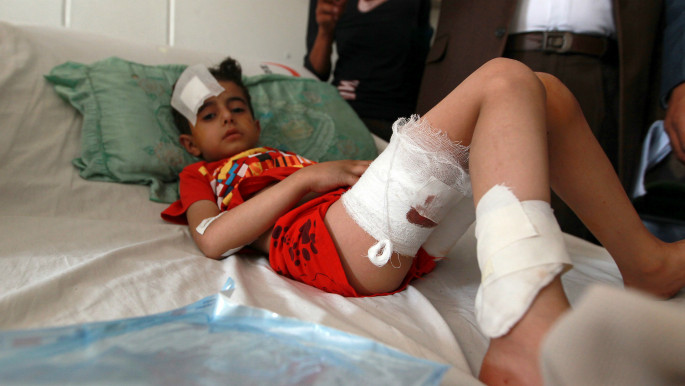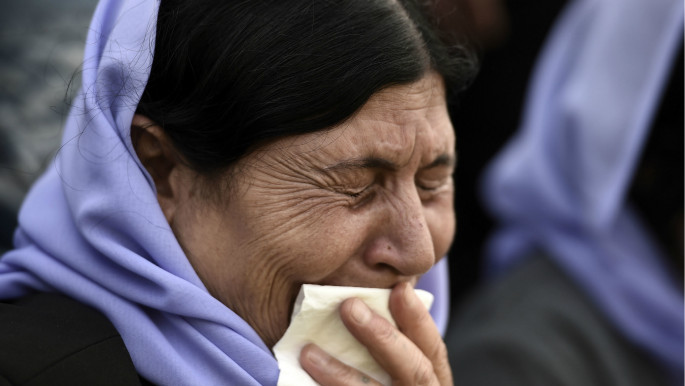
Keeping power in check: this week in Human Rights
Yemen is on the verge of total collapse - a statement that has been reiterated again and again by human right organisations this week.
The UN has said that violence in Yemen has killed an estimated 519 people the past two weeks, 90 of them children, and tens of thousands are fleeing their homes.
The conflict is raising grave concerns about violations of the laws of war, especially after a displaced persons' camp in northern Yemen was hit by an airstrike. Many civilians were killed and many were wounded, including children.
In the first four days of the operation, 62 children were killed, Yemen representative of the United Nations Children Fund, Julien Harneis said.
 |
|
| An injured Yemeni child in Sanaa [AFP/Getty] |
In addition, aid agencies operating in the country are struggling to cope.
The Doctors Without Borders (MSF) team in Yemen has been struggling to get supplies and medical care through to people caught in the violence.
At its Emergency Surgical Unit in Aden, MSF has treated more than 550 patients since 19 March. On 26 March alone, 111 patients arrived at the hospital.
But the aid team says its work is hit by heavy restrictions at sea ports and airport closures which are limiting the movement of people and supplies.
Celebrations cut short
Celebrations commenced in Iraq's Tikrit this week after the prime minister, Haider al-Abadi, claimed the city was liberated from the Islamic State group.
However, at what cost? Destruction, displacement and devestation.
 |
|
| The victory in Tikrit has come at a cost [AFP/Getty] |
This week's "victory" was severely overshadowed by the bitter reality of the battle, as Amnesty International investigated reports of serious human rights violations committed by the Iraqi government and allied forces in the operation to retake Tikrit.
"We are investigating reports that scores of residents have been seized early last month and not heard of since, and that residents' homes and businesses have been blown up or burned down after having been looted by militias," said Amnesty's Donatella Rovera.
"There have also been reports of summary executions of men who may or may not have been involved in combat but who were killed after having been captured."
What freedom of speech?
In January, prominent Bahraini rights activist Nabeel Rajab told al-araby al-Jadeed that "there is no tolerance for any criticism".
On Thursday Rajab was arrested, not for the first time, for things he said about the government.
Rajab is still appealing against an earlier conviction, and his defence lawyer Jalila al-Sayed is not aware of what charges, if any, he will now face.
His wife, Sumaya Rajab, says police surrounded their home and ordered her husband to come out.
She says they refused to provide a copy of the summons but said the arrest was linked to comments Rajab made on Twitter about the treatment of inmates held at Jaw Prison, where unrest broke out last month.
Washington-based Human Rights First, which follows Bahrain closely, called the arrest an alarming setback.
"This is a brazen move to openly target a dissident leader," said Brian Dooley, director of the organisation's human rights defenders programme.
Thursday also saw the arrest of prominent Palestinian parliamentarian Khalida Jarrar, who is an advocate for the rights of Palestinian prisoners.
She was arrested at her home in al-Bireh, near Ramallah, in a pre-dawn raid by armed forces with dogs. Many used Twitter to express their anger and concern over the arrest, and an online campaign is calling for her immediate release.
TAKE ACTION to free Palestinian #feminist lawmaker Khalida Jarrar: http://t.co/1t9ZKnD08mpic.twitter.com/svxxLgRImS
|
Enough is enough
Al-Araby al-Jadeed spoke to a number of Tunisians following the Bardo museum attack, a tragedy that not only affected families of the foreign tourists that were killed, but one that has caused outrage among civilians.
"I am shocked that this has happened in my country. I am shocked that two terrorists can kill so many people," said one. "We are sick and tired from this nightmare. We are hopeless."
"The terrorists kill the sons of normal people like us - where are the sons of presidents, ministers or politicians? Where is the state? Where is the president when we need him."
Tunisian president Beji Caid Essebsi has vowed to fight terrorism "without mercy" - and he definitely has not been showing any mercy when it comes to capturing suspects. Another 23 arrested today.
However, there are some who already believe this crackdown could cause a return to the authoritarian days of the former president, Zine el Abidine Ben Ali, with this fear perpetuated by recent arrests of journalists and scores of people in "anti-terrorism" operations.
So is this merciless crackdown really the right way to go? Only time will tell.
We'll be keeping our eye on human rights transgressions across the region and bringing you another weekly digest next Friday. If you want to share any information or bring our attention to any campaigns please tweet us at @alaraby_en





 Follow the Middle East's top stories in English at The New Arab on Google News
Follow the Middle East's top stories in English at The New Arab on Google News


